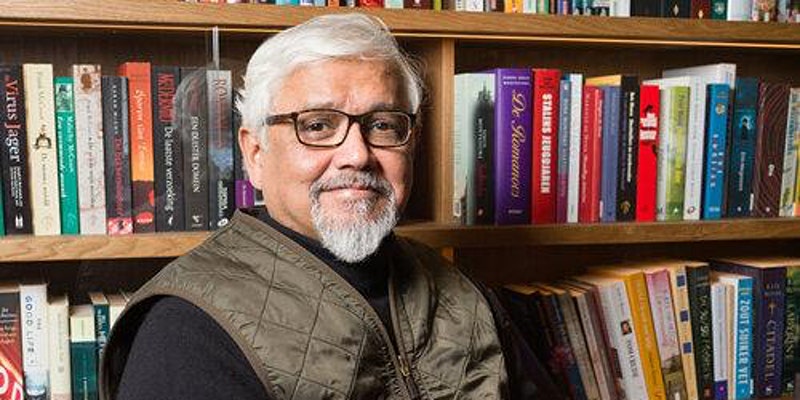Virtual Conversation Amitav Ghosh Apr 23 at 3 pm

**Events may have been canceled or postponed. Please contact the venue to confirm the event.
Date & Time
Sat, Apr 23 3:00 AM - 4:30 AM
Address (map)
Zoom
The Orfalea Center for Global and International Studies at UCSB is delighted to collaborate with the Society for Art & Cultural Heritage of India (SACHI) in presenting an exclusive afternoon with Author, Amitav Ghosh as he discusses his most recent publication, The Nutmeg’s Curse: Parables for a Planet in Crisis.
DATE: Saturday, April 23, 2022
TIME: 3 – 4:30 pm PST
COMPLIMENTARY TICKETS: purchase here.
To avail of free program tickets, please enter promo code COMPLIMENTARY (all caps) and click ‘apply’. This will entitle participants to free Program tickets.
Tickets required: Free tickets: use discount code COMPLIMENTARY
Dr. Ghosh will be in conversation with Dr. Kum-Kum Bhavnani (UC Santa Barbara) and Dr. Sugata Ray (UC Berkeley)
ABOUT THE BOOK
In Ghosh’s hands, the history of nutmeg’s exploitation by the Dutch prefigures our relationship to oil and natural gas and our fundamentally mechanistic view of the earth. Writing explicitly against the backdrop of the COVID pandemic and Black Lives Matter protests, Ghosh frames these ongoing crises in a new way by showing how the colonialist extractive mindset is directly connected to the deep inequality we see around us today. By interweaving discussions of everything from the global history of the oil trade, the migrant crisis, the hyper-militarization of the US, and the animist spirituality of indigenous communities around the world, The Nutmeg’s Curse offers a sharp critique of Western society and reveals the profound ways in which human history is shaped by non-human forces.
ABOUT THE AUTHOR
Amitav Ghosh, a novelist, and essayist is an award-winning author of several books of fiction and non-fiction. His transnational narratives sweep across countries and continents exploring epic themes of travel and diaspora, movement and migration, power and place, history, capitalism and globalization, and man’s relationship to Nature itself. Imparting unusual depth and breadth, Ghosh is a significant voice in 21st-century dialogues.
Amitav Ghosh’s more recent novels comprise The Ibis Trilogy: Sea of Poppies; River of Smoke; and Flood of Fire. This award-winning epic saga, set against the background of the Opium War, was received with great acclaim. His recent non- fictions include The Great Derangement on the climate crisis; and his latest, The Nutmeg’s Curse: Parables for a Planet in Crisis is a brilliant summation of his many big ideas. Ghosh’s work has been translated into more than thirty languages.
In Ghosh’s hands, the history of nutmeg’s exploitation by the Dutch prefigures our relationship to oil and natural gas and our fundamentally mechanistic view of the earth. Writing explicitly against the backdrop of the COVID pandemic and Black Lives Matter protests, Ghosh frames these ongoing crises in a new way by showing how the colonialist extractive mindset is directly connected to the deep inequality we see around us today. By interweaving discussions of everything from the global history of the oil trade, the migrant crisis, the hyper-militarization of the US, and the animist spirituality of indigenous communities around the world, The Nutmeg’s Curse offers a sharp critique of Western society and reveals the profound ways in which human history is shaped by non-human forces.
Ghosh holds two Lifetime Achievement awards and four honorary doctorates. Among numerous awards conferred, he is the recipient of one of India’s highest honors, the Padma Shri, in 2007 for his distinguished contribution to literature. In 2018, India’s highest literary honor was conferred on Amitav Ghosh. In 2019, Foreign Policy magazine named him one of the most important global thinkers of the preceding decade. Born in Calcutta, Ghosh grew up in India, Bangladesh, and Sri Lanka. He studied in Delhi, Oxford, and Alexandria.
ABOUT THE INTERLOCUTORS
Kum Kum Bhavnani is Associate Vice Chancellor and Distinguished Professor, University of California, Santa Barbara. An acclaimed filmmaker, known for her multilayered approach to documenting inequalities, she fuses scholarship with social justice through the combined lenses of the movie camera and critical research. Her recent work increasingly centers on the human aspects of planet earth’s climate crisis. Born in India, Kum-Kum grew up in London and joined UC Santa Barbara in 1991. She actively supports movements that foster greater economic equality – anti-racism, and feminism, and argues in favor of the substantial role of culture as lived experience. Her documentary films include The Shape of Water (2006); Nothing Like Chocolate (2012); Lutah (2014); We are Galapagos (2016) and her most recent project, Science for Nuns and Monks. From 2018-to 2020 Kum-Kum Bhavnani served as Chair and Vice-Chair of the University of California Systemwide Senate.
Sugata Ray, Director (Interim), Institute for South Asia Studies, and Sarah Kailath Chair of India Studies is Associate Professor of South and Southeast Asian art and architecture in the Dept. of History of Art, and Dept. of South & Southeast Asian Studies. He is co-founder of the South Asia Art Initiative at the University of California, Berkeley. His research and writing focus on climate change and the visual arts from the 1500s onwards. Ray is the author of Climate Change and the Art of Devotion: Geoaesthetics in the Land of Krishna, 1550-1850 (2019) and co-editor of Ecologies, Aesthetics and Histories of Art (forthcoming) and water Histories of South Asia: The Materiality of Liquescence (2020). He is currently writing a book on Anthropocene extinction in the early modern period.
